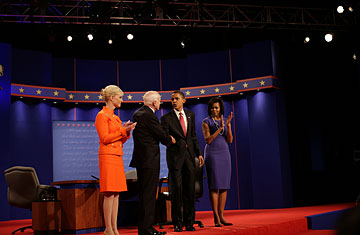
Senators Barack Obama and John McCain participated in the third and final presidential debate at Hofstra University in Hempstead, N.Y., on Oct. 15
Only a cynic would dismiss a presidential debate as a mere television show. You would have to be naive, though, to ignore the drama of these events: Two people enter an arena. Only one will emerge as the protagonist of our national life — also known as the President.
For the first 30 minutes of last night's final debate, a sharper, more spirited John McCain took on Barack Obama. He had a clear message of low taxes and smaller government. He targeted an equally clear-cut audience: Joe the Plumber. (A real guy, who must be dodging every local news crew within 100 miles today.) McCain — henpecked by an incumbent he never liked, a dire economy he can't control and a newcomer with less baggage than the Tooth Fairy — suddenly seemed free from worry. He remembered his years as a leading man in those dramatic episodes of yesteryear — campaign-finance reform, the Gang of 14 — and he was glad to reprise his role as The Fighter. For the first time since the Republican convention (just six weeks ago, though to him it must feel like years), John McCain was in control of the narrative.
The problem for McCain was that no matter how hard or how crisply he punched, it would not last. In the end, the gravity of the debate returned to Obama. The turning point was when McCain finally brought up the issue of Obama's ties to former anti–Vietnam War terrorist William Ayers. All McCain accomplished was to swing the spotlight away from himself back to the engaging newcomer. Predictably, Obama had a mild answer ready — as straightforward and uncontroversial as it was soothing. Was it entirely candid? Who asks that of Cary Grant?
When moderator Bob Schieffer encouraged the two men to air their grievances against each other, all the drama hung around Obama the Imperturbable. "I think the American people are less interested in our hurt feelings," Obama said. "I don't mind being attacked for the next three weeks. What we can't afford is four more years of the same failed economic policies."
Obama had regained control of the story.
If you look at the sweep of this election year, you can see how everything funnels down to the basic question of Barack Obama. This is a "change" year if ever there was one. McCain can't help it that fewer than 10% of Americans believe the country is on the right track — the lowest number since polls were invented.
So McCain tried in the final debate to say that his own brand of change is good change. A tough move. The hardest thing in politics is for the incumbent party to run on change. Remarkably, it was at the end of the last debate when McCain remembered to mention that the Democrats have controlled Congress for the past two years.
Mostly McCain tried to say that Obama's change is dangerous. Across the table, there sat the Illinois Senator, looking not very dangerous. And thanks to a very long, very hard year on the campaign trail, Obama sported a motley crop of gray hair; perhaps for the first time, he even looked the part of a President.
Which happens to be his strong suit. Through 4 1/2 hours of high-stakes presidential debating, Obama never looked unprepared, even for an instant. He looked slippery now and then — they all do. He looked boring sometimes. He even seemed to strive for boring, to understand that boring is good for the candidate in the lead.
But dangerous?
Not judging from the polls.
Consider two parallel graphs: one tracks the stock market during the past two weeks. Stamp it in steel and you could cut down a redwood with it. It's a jagged picture of uncertainty and confusion.
The next graph charts the presidential race. For the past two weeks, it has been nearly flat. Gallup's daily tracking poll, for instance, has been remarkably stable. Every day for two weeks, Obama has been within 1 1/2 points of his average, while McCain has been within a single point of his.
Perhaps the only stable thing in American today is the presidential race. During one of the most dramatic months in our economic history — and during four widely watched debates — the markets have plunged and bungeed. Bill Ayers and Sarah Palin and a dozen other minidramas flared and guttered. And the gap remains steady between the man who dominates the discussion and the man who wants to shake it up.
This year's debates were good. Lots of voters watched them. And yet they seemed almost evanescent. What will be remembered, apart from Palin's enormous winks? McCain wanted to change a deadly fact that has threatened to crush his campaign from the beginning: he's a Republican loaded with the baggage of George W. Bush. He had to rewrite the script. Obama? All he's had to do is read the one that was written.
